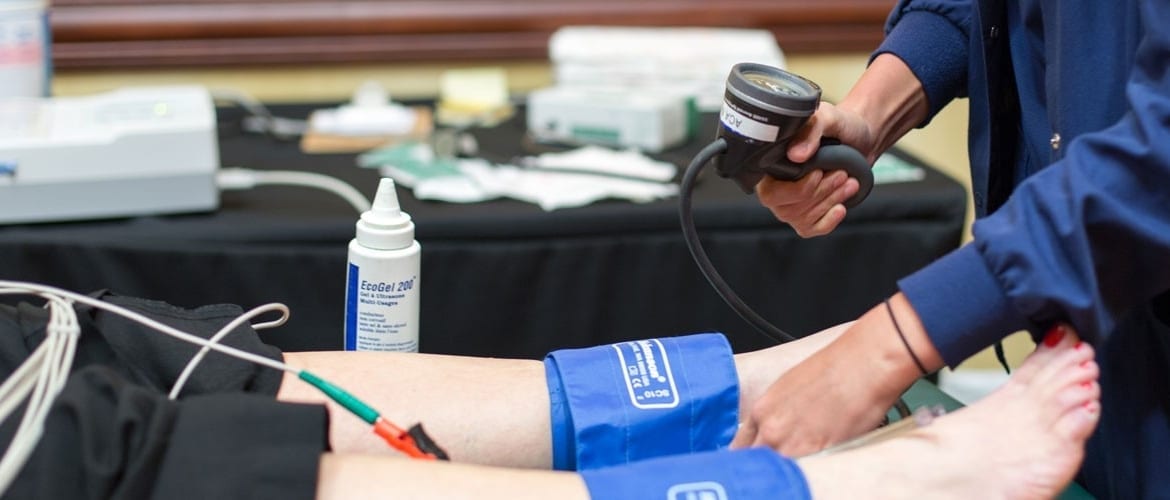The podiatrists at our podiatry clinic are experts in diabetic foot care. Diabetes can have a number of important effects on the feet making the feet high risk in compromised diabetic patients. Prevention is the best cure when it comes to caring for your feet with diabetes and regular podiatry visits are essential. Our friendly podiatrists are here to help and will make sure you get the best foot care to help prevent diabetic complications.
What is diabetes?
Diabetes is a complex condition where the body no longer produces or produces insufficient quantities of insulin, resulting in increased sugar (glucose) levels in the blood stream. This can have a number of adverse effects on the feet and it is why preventative foot care is important for all patients who suffer from diabetes. There are two types of diabetes:
TYPE 1 DIABETES – occurs in people where the pancreas fails to produce any insulin.
TYPE 2 DIABETES – is the most common form and occurs when the pancreas can still produce insulin but it does not produce enough or it is ineffective.
It doesn’t matter if you suffer from type 1 or type 2 diabetes it is still vitally important you see one of our podiatrists as your feet may be at risk.
Why is it important to see a podiatrist if you have diabetes?
It is important that all patients diagnosed with diabetes see a podiatrist. Diabetics are more at risk of foot problems because of the following potential complications with diabetes:
• Damage to the nerves in the feet (neuropathy)
Neuropathy can result from poor blood glucose control and damage to the nerves in your feet. This causes a loss of protective sensation meaning your feet may be unable to detect injury. For example you may not be aware of an ulcer on the bottom of your foot as you do not feel any pain. This can then lead to more serious foot complications like infection or even amputation if not treated. Symptoms of neuropathy can include numbness, tingling, pins and needles or a burning sensation in the feet.
• Damage to the blood vessels that supply the lower limb
Poor blood glucose control may cause a reduction in the blood supply to the feet, the inner lining of the blood vessels can change in structure. Poor circulation delays healing and makes people with diabetes more susceptible to infection following any cut or wound to the foot. Symptoms of poor blood supply may include cold feet, cramps and pain.
If you have diabetes it is important to see one of our podiatrists at our clinic for preventative foot care. Diabetics who have nerve damage, poor circulation, and neglect their feet are at high risk of developing more serious foot problems like ulcers, infections and even amputation.
How often should I see a podiatrist if I have diabetes?
People who suffer from diabetes should see a podiatrist as soon as they are diagnosed. An initial diabetes foot check will help determine how often you should visit a podiatrist for diabetic foot care and prevention of diabetic foot problems. Remember your feet are more at risk with diabetes and prevention is the best cure, making a podiatrist an integral member of your diabetes health care.
National Diabetes Health Care Guidelines recommend people with diabetes have their feet checked by a podiatrist at least every 6-12 months.
What is involved in a diabetes foot health assessment?
A diabetes foot health assessment is conducted by our podiatrists, it involves obtaining a thorough medical history and foot assessment. Our podiatrists will assess the circulation (blood flow) and sensation in your feet.
The nerves in our feet can become impaired as a result of diabetes, this results in reduced sensation or ability to feel any stimulus on the feet. A validated instrument is used where designed points on the feet are tested and patient is required to notify podiatrist whether they could feel the point and at which location. This a quick, painless and reliable test of protective sensation.

Our podiatrists will then assess the blood flow in your feet. This is carried out using a machine known as a doppler ultrasound. This machine gives an audible signal of how strong the blood flow is through the foot vessels. A waveform measuring the peak the blood is then printed out and attached to the report.

Prevention of diabetic foot problems
Having diabetes can increase your risk of foot problems. Prevention is vital to help prevent more serious foot problems like ulceration, infection and amputation from occurring. If you suffer from diabetes then you should look after your feet by doing the following:
- Inspect your feet daily for any visual signs of problems.
- Protect your feet from injury. This includes good fitting footwear.
- Make an appointment with one of our podiatrists immediately if something doesn’t look right.
- Have an annual diabetes foot check with one of our podiatrists to determine if your feet are at risk.
- Dry thoroughly between your toes after showering
- Apply emollient daily to improve skin hydration and integrity
Orthotics and Footwear
A major problem with diabetic feet can be foot ulcers. These are caused by excess pressure on a bony area of the foot and diabetics with reduced sensation and circulation will be more at risk. Pressure ulcers left untreated can progress to more serious problems like infection and even amputation. Foot orthotics can help diabetic feet by helping to reduce excess pressure areas.
Orthotics improve foot function and help redistribute pressure across the whole of the foot. Our podiatrists are experienced in orthotics and diabetes feet. They can help identify pressure areas on your feet that may be at risk. Prescription of well-designed custom orthotics with specific padding can be used to help prevent ulceration and further diabetic complications.


